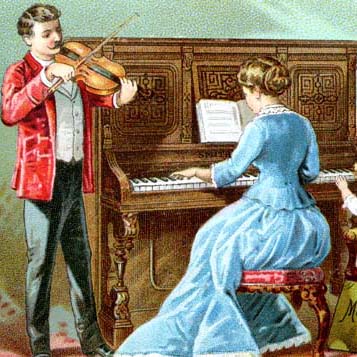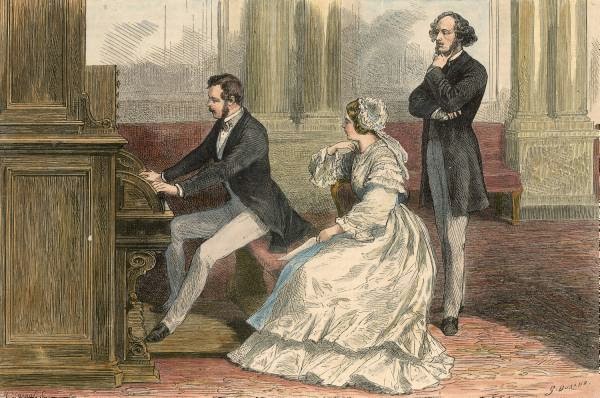Amateur Lovelock and Loveluck Musicians |
 |
Presented below are brief mentions culled from the newspapers of the time of some of the hundreds of Lovelocks, and at least one Loveluck, who, in Yann's words, 'have brought pleasure and entertainment to their fellows' : | |
 |
On 31 December 1881 'The Bucks Advertiser and Aylesbury News carried a report of a Boxing Day performance of 'one of their popular entertainments' by the members and friends of the Hemel Hempstead Working Men's Club. The second item in the programme was a part song 'Whispering Leaves' rendered by the Glee Class, consisting of Mr Lovelock and family. That was followed by Mr T Lovelock with 'Jack's Song', then the Misses Lovelock sang 'The Robin's Song' for which they received an encore. Next up were Mr C P Lovelock and Master Walter Henry Keen who performed a pianoforte and flute duet 'Napier's Triumphal March'. After a short comic song interlude Miss Kate Lovelock was back on stage to deliver a song and chorus 'Chiming Bells of long ago' which also received an encore. After Mr Matthews delivered 'Never trouble, trouble' Miss Kate Lovelock returned with her sister Carrie to perform a duet of 'The Convent Bells'. Mr C P Lovelock then gave a rendering of the song 'The Slave Chase', back came the Glee Class to deliver 'Sleighing Song' featuring the Misses Lovelock accompanied by bells, which was such a favourite with the audience that they once again demanded an encore. Miss Cromack, Miss Kate Lovelock and Master Walter Henry Keen accompanied the several pieces. The second half of the evening's entertainment was entirely taken up with a farce, from which the Lovelocks were allowed to take their rest! This wonderful family were members of the Wallingford Line, Caroline, Kate and Charles Prior being the children of Thomas and his wife Lydia Ann Saltmarsh. There were another 6 children in the family, so the Glee Class might have been a quite formidable ensemble. Indeed, 'The Hemel Hempstead Gazette' had reported on 10 December 1881 how Mr Lovelock and his five daughters had received perhaps the loudest and longest burst of applause as they concluded the evening's entertainment on 7 December by members of the Mutual Improvement Society.
Another Buckinghamshire Lovelock featured in a report by 'The Henley Advertiser' on an entertainment given in the Nettlebed Schoolroom on 17 April 1895 by gentlemen from Henley to raise funds for the Nettlebed Cricket Club. A mixed programme included Mr J Lovelock delivering the comic song 'Oompah', and a comic duet 'We'll run 'um in' with Mr Simmonds, whilst also taking part in a comic sketch 'Robbers in the House' and a laughable farce 'Caught in his own Trap'. Although not certain it seems likely that our hero of the boards here was James Lovelock of the Lambourn-Sparsholt Tree who was certainly living in Henley in 1891.
Much later than the above, another successful evening's entertainment on 9 March 1934 was reported by 'The North Wilts Herald'. It took place in the Schoolroom of Wootton Rivers and had been organised by Mr A J Lovelock, the Secretary of the local branch of the Mothers' Union in aid of their funds. There was, apparently, a large audience who showed keen appreciation of all the items presented. The evening began with action songs and recitations by some of the infant pupils, followed by a playlet, 'The Prince and the Swineherd', and a duet and dance by Christine Lovelock and Mary Teagle. In the second half of the programme the audience were presented with 'a concerted item' called 'Mrs Rush' that involved Mrs Teagle, Mrs Rush, Mrs Ralph, Mrs Wort, Mrs Millsom and Mrs Lovelock of the Mothers' Union. Other items included a monologue by F C Lovelock entitled 'The pot that wanted mending', and another monologue by Mrs Lovelock 'Never been courtin' before'. The final piece was another concerted item called 'John Braddulum' performed by E Lovelock and members of the Mothers' Union. Christine was probably Christine Florence, and A J her father Alfred John from the Lieflock Line, whilst F C and E Lovelock were probably members of one of the Wootton Rivers Trees.
One of the publications that covered events in Staffordshire was 'The Chronicle'. On 14 December 1889 it reported on an entertainment on 6 December in Aston near Stone in aid of the school piano fund. There was a long and interesting programme that included some readings, the comic songs of Mr C Hill and and the songs of Miss Lovelock that were all much enjoyed. Other items included Mr F Lovelock singing 'The Slave Chase', which drew an encore, Miss Lovelock singing 'Needles and Pins, which did likewise, a duet 'The Brothers' delivered by Messrs Lovelock and Boden, and another solo from Mr Lovelock as he sang 'The Boys in Red'. One of the Lovelocks present on that evening has already appeared on this page, for 'Miss Lovelock' was none other than Kate Elizabeth from the Wallingford Line, and 'Mr F' was her older brother Frank. He of course sang the very same song that evening that his younger brother Charles had sung back in 1881, so perhaps it was a family favourite.
We turn next to 'The Witney Gazette' of 27 September 1890, an Oxfordshire publication. This issue contained a report on the annual entertainment of the Mutual Improvement Society on 25 September. The report states that 'As all did their best to amuse the audience it would be invidious to particularise, but the Misses Lovelock who are visiting the town, sang their songs particularly well and deservedly received encores'. The Misses in question were Maggie Lovelock who sang 'On the Zuyder Zee' and Emily Lovelock who sang 'No thank you, Tom'. There is, alas, no clue to the identity of Maggie and Emily, although they are probably Margaret Rolph Lovelock and Emily Saltmarsh Lovelock, two more of the children of Thomas Lovelock and Lydia Ann Saltmarsh from the Wallingford Line. The two sisters appeared in another concert on 29 August 1895 at Warborough of which 'The Berks and Oxon Advertiser' stated 'Among the most pleasing items of the programme were the duets by the Misses M R and E S Lovelock. These ladies were vociferously encored for their fine rendition of 'Gentle Spring', and in response to an encore for Miss E S Lovelock's 'Trespassing' she was joined by her sister in the duet 'Goodnight' which brought a most enjoyable evening to a close'. What a musical family!
North now to Parwich in Derbyshire where the Glee Club presented one of their annual concerts on 28 January 1913. 'The Ashbourne Telegraph' reported that a full programme included 'the duet 'Love Divine' very sweetly given by Miss Lovelock and Mr Fram'. Later on in the programme 'a pretty duet entitled 'Life's Dreams' was sung with much feeling by Miss Lovelock and Miss Hopkinson'. Although we can not be sure, it seems probable that Miss Lovelock was Sylvia May Odom Lovelock who was a Teacher boarding in the village in 1911. Sylvia was a member of the Wroughton- Tidcombe Tree. As evidence we may note that in the 1921 Census Sylvia, and her husband William Alexander Lindsay, were recorded as Visitors to Ethel May Hopkinson in Parwich, who was also a School Teacher, although Sylvia had given up work by then. In another aside, Sylvia and William had a daughter born, and unfortunately died, in 1918, but not before they had named her Ruth Lovelock Lindsay.
A rather different kind of musical evening featured in a report by 'The West Middlesex Advertiser' of 12 July 1862 on a concert given by the Chelsea Sacred Harmonic Society on 8 July. The first part of the programme consisted of Mozart's 12th Mass. The solo parts were borne by Messrs Lovelock, Howard and Robson who apparently 'acquitted themselves to the satisfaction of the audience, as it testified by warmly applauding the several parts'. The second part of the programme began with 'a symphony from Mozart' and was followed by a quaint Elizabethan madrigal entitled 'Softly sweet in Lydian Measures' nicely sung by Mr Lovelock, Mr Goddard being violoncello obligato. 'Both gentlemen were warmly applauded.' Mr Lovelock later joined with Mr Robson to deliver the duet from 'The Lilly of Killarney' entitled 'The Moon has raised her lamp above'. The critic reported that 'this gem from the Irish opera was evidently valued by the audience'. Unfortunately there are no clues to the identity of 'Mr Lovelock', but resident in Chelsea in 1861 was James Frederick Lovelock, the son of the James Lovelock who founded the company that made a range of culinary appliances, the both of them from the Baughurst Fragment.
An entertainment consisting of vocal and instrumental music and readings was given in the Belfry Schoolroom in Overstrand, Norfolk on 28 December 1885. Two days later 'The Eastern Daily Press' reported that 'The pieces sung by Miss Dashwood and Miss Lovelock (from Emneth Vicarage), being simple but effective ballads seemed to give real pleasure to the audience, who are to be congratulated on having shown good taste from a musical point of view by selecting them for approval.' [Which seems to smack a little of damning with faint praise!] Miss Lovelock later performed a solo -'Though the Day be Never so Long', and joined Miss Simpson and Mr H Sayers in a trio 'Vadasi via di qua' [Get out of here!]. Miss Lovelock was the daughter of Rev. Edward Henry Lovelock and Catherine Simpson of the Islington Tree, and must have been Anna Maria who was born in 1859. Together with her sister Mary she attended the Clergy Daughters School in Casterton, Westmorland where no doubt they were taught to sing. Mary alas died in 1876 at the age of only 22.
The briefest of mentions in 'The Portsmouth Evening News' of 14 November 1944 reported that a Poppy Day Appeal concert had been given in the Powerscourt Road Church Hall by the 'Sunshine Entertainers'. Two outstanding items mentioned were pianoforte and accordion solos performed by Beulah Lovelock.
'The Islington Daily Gazette and North London Tribune' of 11 February 1903 reported on a concert given by the Swan Choral Society two days previously at 'The White Swan' in Salisbury Court, EC. Mr H Mudge 'did duty at the piano in a most able manner' and no doubt accompanied Miss Alice Lovelock, who pleased all by her negotiation of 'While the dance goes on' and 'Skylark', and Miss Minnie Lovelock, who made good use of her fine voice in 'I can't tell you why I love you, but I do'. The Misses Lovelock appear to be two daughters, Alice Maud Mary and Minnie Louisa, of Richard William Lovelock and Mary Coates Wells of the St Pancras (Main) Tree.
Forest House in Leyton, Essex, a home for elderly gentlemen, was the scene of a concert on 16 April 1898. A report was published by 'The Eastern Counties Times' a week later which referred to two solos performed by Mr Harry Loveluck, the first on the banjo and the second on the fairy bells. Harry may well be a member of the Glamorgan Loveluck Line, but does not feature in the current version of it.